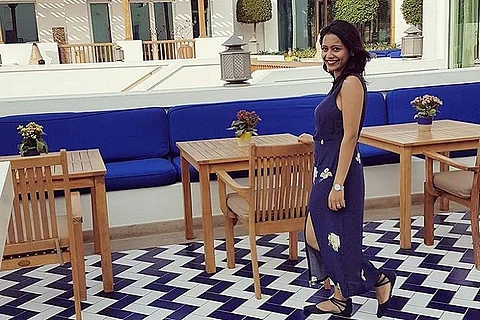

Traditionally, writing poetry and penning film lyrics have had an incandescent connection. Because every film lyricist began as a poet once upon a time. But Anu Elizabeth Jose admits to have never written poetry in her life.
Writing, she says, started by accident at her Plus Two farewell party. She wrote some random lines for a song and that was the beginning. Later, while doing her Engineering at FISAT, she gamely wrote a few more lines for a senior’s album which was first made in Tamil and later in Malayalam (which she wrote). For someone who had only studied Malayalam till the 10th, writing lyrics for Malayalam film songs still seems sort of unbelievable.
June is her 17th film as a lyricist, after making her debut in Vineeth Sreenivasan’s Thattathin Marayathu. Often, she has done the whole album or been assigned to write two or three songs in an album. Thira, Aanandam, Philips and the Monkey Pen, Natholi Oru Cheriya Meenalla, and Vegam are some of her notable works.
Till a few days ago, I had no idea that you also wrote the lyrics for Thattathin Marayathu…
Yeah, so this is how it happened. Ganesh Raj (director of Aanandam), who was assisting Vineeth Sreenivasan in that film, was also my FISAT batchmate and when Vineeth wanted to get a female perspective through the lyrics, he suggested my name.
I still remember that call during a college trip. His narration is still fresh in my mind—it was so visual...felt like I was watching the film.
What was the brief?
It was mostly Aisha-Vinod references. He felt there is a perspective difference between a man describing a woman and a woman describing a woman. Thamarai’s lyrics in Gautham Menon’s Vinnaithandi Varuvaya was the reference and he asked me to listen to it n number of times to get a feel of it. And then I wrote ‘Thattathin Marayathe Penne’, ‘Muthuchippi Poloru’ and ‘Syamabaram.’
Is it about going beyond the physicality of a woman?
Yes, it’s about going beyond her physical attributes—her lips, her hair, her body. Like I spoke more about the softness in her eyes than the beauty of her eyes.
Thamarai is the only name that crops up when one talks about the female presence among lyricists in Indian cinema. The ratio is shockingly inequal, isn’t it?
Ironically, it was the quality of being a woman that got me my first film. I have always wondered about this as we come from a culture where mothers sing lullabies.
What’s your process?
It’s the picture captions. I try to picture the beautiful images first, draw it and then put it into words. Aisha was already painted in acrylic for me, all I needed was words to fill it up.
So, what would you say to the purists who vouch for the traditional form of lyric writing?
I would always vouch for the beauty of that form of writing. Ideally, what we are doing is squeezing words into a tune, kind of smothering them to make them fall in place with the rhyme and rhythm. By doing so, we often ruthlessly change words according to the metre of a song and that really affects the writing. But well, you can’t win them all.
Which has been the most difficult song to write?
It has to be ‘Rakshaka Nee’ from Kadal Kadannoru Mathukutty. As a rule, I need space to visualise, for the song to grow on me. I need to keep listening to it, get a feel and only then do I write. But here I was asked if I could come on the sets and write and that totally scared me. Shahbaz Aman (music director) played it for me and I had to write. The brief was simple—Mammootty is back from Germany and meets his ex-lover in the church. It cannot be romantic nor a typical Church song. Finally, Aman, who understood my apprehensions, took me to the set which was a church, allowed me the time to get a feel of the song and then I wrote it. The final product wasn’t all that bad I think.
How long does it take you to write a song?
It can range from 30 minutes to a week. At times, I might take a lot of time to start or sometimes just a hymn is enough for me to get inspired enough to write. The fastest I wrote was for Natholi. Thattathin Marayathu took time, with a lot of corrections. I am not really worried about how it will be played on screen.
What are some of the most outrageous demands that have been made about writing a song?
I don’t know about outrageous demands but when I am asked to make it simple, it worries me. It’s not easy to string a song using words we often use colloquially— ‘Machane Machu’ is a song in that genre that clicked but I'm skeptical to attempt it. I prefer writing soft melodies. When you try hard to add certain words for effect, it might sound good at that time but won’t really sustain. I felt my quality of work wasn’t great in Natholi Oru Cheriya Meenalla. It had everything going for it, tune, sung well but my lyrics were a downer.
What’s this new deal about bringing in two or three writers for an album and often for a song?
It’s fine as long as you are told that the one you wrote won’t be used. Sometimes I've heard they ask four people write a song and finally pick one from that.
Which is your go-to-song to cheer up?
It has to be ‘Azhalinte Azhangalil’ (Ayalum Njanum Thammil)—sorrow has so much depth, happiness after a point starts to become an unintentional comedy.